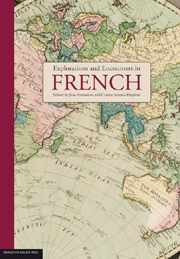Book contents
- Frontmatter
- Contents
- Foreword and Acknowledgements
- Expressions of Support
- Editors' Note
- Encountering French and the French
- Historical Explorations
- Intercultural Encounters
- Exploration of the “Other”: Teaching and Learning Socio-Pragmatic Competence through French Film Extracts
- Visions and Revisions: Language Learning for Cultural Mediation
- Explorations in the Classroom
- Table of Illustrations
- Appendix 1 Conference History
- Appendix 2 Contents of the CD-ROM
Exploration of the “Other”: Teaching and Learning Socio-Pragmatic Competence through French Film Extracts
from Intercultural Encounters
Published online by Cambridge University Press: 05 June 2012
- Frontmatter
- Contents
- Foreword and Acknowledgements
- Expressions of Support
- Editors' Note
- Encountering French and the French
- Historical Explorations
- Intercultural Encounters
- Exploration of the “Other”: Teaching and Learning Socio-Pragmatic Competence through French Film Extracts
- Visions and Revisions: Language Learning for Cultural Mediation
- Explorations in the Classroom
- Table of Illustrations
- Appendix 1 Conference History
- Appendix 2 Contents of the CD-ROM
Summary
Introduction
Anna's story
I would like to begin with the story of Anna (not her real name); her father introduced her to French at the age of two. Although he was born in Australia, he spoke fluent French and taught her French nursery rhymes and songs. Anna went on to study French at school from reception to Yr 12, and had the opportunity to visit France on several occasions with her family. To most of us, this would seem to be an ideal situation. Yet, in spite of this, Anna disliked French as a school subject and developed a negative attitude towards the French people, but she “hanged on to it” because the subject was easy for her.
In attempting to explain Anna's dissatisfaction with the language and her attitude towards the French people, two critical factors strike me. Firstly, Anna reported that she had no less than seven teachers of French throughout her years of schooling, and the only one she liked was her Yr 12 teacher. Secondly, she developed her negative attitude towards the French while visiting France with her family. Anna found, in particular, that the people there were “rude” to her. This “us vs. them” reaction is not an uncommon experience among first-time travellers and has now been quite well documented by intercultural researchers and educators who state that without thorough preparation this first visit in the foreign land does not necessarily foster more open mindedness, or greater tolerance toward others.
- Type
- Chapter
- Information
- Explorations and Encounters in French , pp. 167 - 194Publisher: The University of Adelaide PressPrint publication year: 2010



